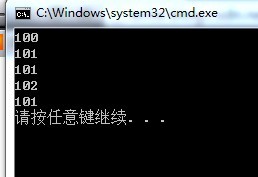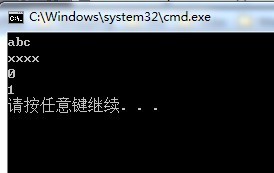一、++运算符重载
前置++运算符重载
成员函数的方式重载,原型为:
函数类型 & operator++();
友元函数的方式重载,原型为:
friend 函数类型 & operator++(类类型 &);
后置++运算符重载
成员函数的方式重载,原型为:
函数类型 operator++(int);
友元函数的方式重载,原型为:
friend 函数类型 operator++(类类型 &, int);
#ifndef _INTEGER_H_
#define _INTEGER_H_
class Integer
{
public:
Integer(int n);
~Integer();
Integer &operator++();
//friend Integer& operator++(Integer& i);
Integer operator++(int n);
//friend Integer operator++(Integer& i, int n);
void Display() const;
private:
int n_;
};
#endif // _INTEGER_H_#include "Integer.h"
#include <iostream>
using namespace std;
Integer::Integer(int n) : n_(n)
{
}
Integer::~Integer()
{
}
Integer &Integer::operator ++()
{
//cout<<"Integer& Integer::operator ++()"<<endl;
++n_;
return *this;
}
//Integer& operator++(Integer& i)
//{
// //cout<<"Integer& operator++(Integer& i)"<<endl;
// ++i.n_;
// return i;
//}
Integer Integer::operator++(int n)
{
//cout<<"Integer& Integer::operator ++()"<<endl;
//n_++;
Integer tmp(n_);
n_++;
return tmp;
}
//Integer operator++(Integer& i, int n)
//{
// Integer tmp(i.n_);
// i.n_++;
// return tmp;
//}
void Integer::Display() const
{
cout << n_ << endl;
}#include "Integer.h"
#include <iostream>
using namespace std;
int main(void)
{
Integer n(100);
n.Display();
Integer n2 = ++n;
n.Display();
n2.Display();
Integer n3 = n++;
n.Display();
n3.Display();
return 0;
}

需要注意的是为了区别于前置++,后置++多了一个int 参数,但实际上是没作用的,设置断点调试的时候可以发现默认赋值为0。
而且此时成员函数不能与友元函数共存,因为调用++运算符时不明确。
二、赋值运算符重载、!运算符重载
#ifndef _STRING_H_
#define _STRING_H_
class String
{
public:
explicit String(const char *str = "");
String(const String &other);
String &operator=(const String &other);
String &operator=(const char *str);
bool operator!() const;
~String(void);
void Display() const;
private:
char *AllocAndCpy(const char *str);
char *str_;
};
#endif // _STRING_H_#pragma warning(disable:4996)
#include "String.h"
#include <string.h>
#include <iostream>
using namespace std;
String::String(const char *str)
{
str_ = AllocAndCpy(str);
}
String::String(const String &other)
{
str_ = AllocAndCpy(other.str_);
}
String &String::operator=(const String &other)
{
if (this == &other)
return *this;
delete[] str_;
str_ = AllocAndCpy(other.str_);
return *this;
}
String &String::operator=(const char *str)
{
delete[] str_;
str_ = AllocAndCpy(str);
return *this;
}
bool String::operator!() const
{
return strlen(str_) != 0;
}
String::~String()
{
delete[] str_;
}
char *String::AllocAndCpy(const char *str)
{
int len = strlen(str) + 1;
char *newstr = new char[len];
memset(newstr, 0, len);
strcpy(newstr, str);
return newstr;
}
void String::Display() const
{
cout << str_ << endl;
}#include "String.h"
#include <iostream>
using namespace std;
int main(void)
{
String s1("abc");
String s2(s1);
String s3;
s3 = s1;
s3.Display();
s3 = "xxxx";
s3.Display();
String s4;
bool notempty;
notempty = !s4;
cout << notempty << endl;
s4 = "aaaa";
notempty = !s4;
cout << notempty << endl;
return 0;
}需要注意的是我们将构造函数声明为explicit,故s3 = “xxxx”; 不能将”xxxx” 先隐式转换成临时String再调用
String &operator=(const String &other);可以再重载一个 String& operator=(const char* str); 函数。!运算符这里指当字符串不为空时为真。

参考:
C++ primer 第四版
Effective C++ 3rd
C++编程规范





















 1793
1793











 被折叠的 条评论
为什么被折叠?
被折叠的 条评论
为什么被折叠?








